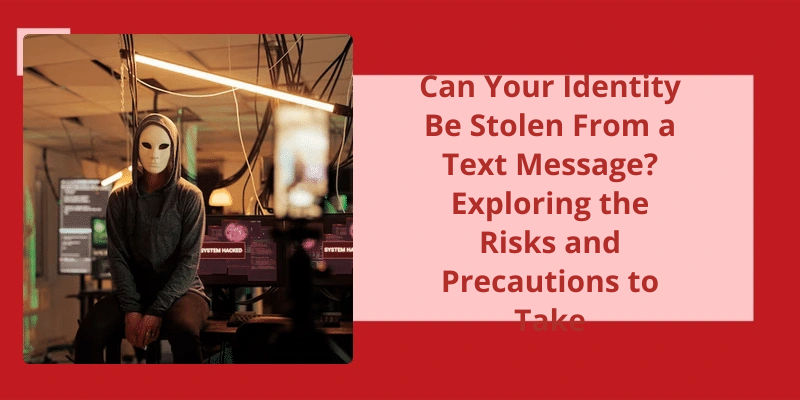In today's digital age, we often rely on text messages for communication with friends, family, and even businesses. However, as we become more reliant on this technology, the risk of identity theft from text messages increases. Scam artists have become increasingly sophisticated and use various techniques such as email-to-text technology, short codes, or spoofed local numbers to trick victims and hide their true identity. Therefore, it’s important to approach any text message with caution and be vigilant about protecting your personal information. If you receive a text message requesting personal information or directing you to a website, it’s crucial to verify the authenticity of the message and contact the relevant bank, government agency, or company through the information listed in your records. Ignoring these precautions could lead to serious consequences and make you vulnerable to identity theft.
Can Someone Steal Your Information Through a Text?
Text messaging has become the preferred mode of communication for many individuals around the world. It’s fast, convenient, and can be used to convey a variety of information. Unfortunately, with the rise of text messaging, there’s also been an increase in the number of scams and phishing attacks that target unsuspecting users.
While it’s true that someone can steal your information through a text, it’s important to note that this can only happen if you click on a link included in the text. This is how most hackers and cybercriminals gain access to your personal data. Once you click on the link, you’ll be directed to a phishing website, where you’ll be asked to enter your personal information.
To avoid getting hacked, you should never click on a link that comes with a text or email—unless you’re absolutely sure of the senders identity. This is because many hackers now use social engineering techniques to trick users into clicking on links that appear to be legitimate. For example, they may send you a text or email that looks like it’s from your bank, asking you to click on a link to reset your password.
One of the best ways to protect yourself from these types of attacks is to install a good antivirus software on your device. This will help you detect and block suspicious links and websites before they can cause any harm. Additionally, you should always be wary of texts or emails that ask for your personal information, such as your social security number or credit card details.
To prevent this from happening, you should always be careful when clicking on links from unknown sources and make sure to install good antivirus software on your device. By taking these simple steps, you can protect yourself from the growing number of cyber threats that exist today.
Types of Scams and Phishing Attacks That Target Users Through Text Messages
Various types of fraudulent activities and phishing attacks are being carried out through text messages to manipulate and trick users. These scams can range from fake lottery winnings, employment offers, and fake debt collectors to fraudulent banking alerts and updates. Tech-savvy scammers can also create convincing schemes that appear to be legitimate but in reality, they’re phishing attacks or a way to inject malware into your device. So, it’s essential to be cautious and avoid clicking on unknown links or sharing personal information through text messages.
As technology advances, so do the tactics of hackers. While many may think that text messages are a secure form of communication, it’s important to understand that they may not always be private. In fact, hackers could potentially gain access to sensitive information through spying on your texts. This isn’t something to take lightly, as it could have major consequences for your personal and financial security. So, what can you do to protect yourself? Let’s explore some options.
Can a Hacker Receive My Text Messages?
There are a few ways that a hacker could potentially gain access to your text messages. One common tactic is known as SIM swapping, where the hacker will convince your cell phone carrier to transfer your phone number and account to a new SIM card owned by the hacker.
It’s important to note that hacking into someones text messages is illegal in most cases. However, there are some instances where it may be legal for law enforcement to intercept someones text messages – such as when investigating a potential crime. But in general, it’s important to protect yourself from any potential attacks by using strong passwords, keeping your phone up-to-date with the latest security patches, and avoiding opening any suspicious links or attachments in your text messages.
First, make sure that youre using a strong and unique password for all of your online accounts – especially those that use SMS verification codes. Additionally, you can enable two-factor authentication (2FA) on your accounts whenever possible, which adds an extra layer of security by requiring you to enter a code sent to your phone in addition to your password.
Finally, if you think that your text messages have been compromised, it’s important to take action right away. This might include changing your phone number, contacting your carrier to report suspicious activity, and even contacting law enforcement in some cases. By taking proactive steps to protect yourself, you can help ensure that your private information stays private – and that hackers are unable to access your text messages or other sensitive data.
It’s important to consider the safety of our private information when communicating through various channels. Texting may seem like a convenient and easy way to communicate, but it’s important to be aware that messages may not be as secure as we think. In fact, there are a number of potential risks to sharing sensitive information via text messages that we should all be aware of. Let’s take a closer look at some of these risks and what we can do to protect our information.
Is Texting Sensitive Information Safe?
In todays world, we’re constantly bombarded with new ways to communicate. But with all those shiny tools come alarming concerns when it comes to privacy and security. One such communication tool is texting. While texting is an incredibly convenient way to stay in touch with friends and colleagues, it’s important to consider whether texting sensitive information is safe. Unfortunately, the answer is no.
Text messages aren’t as private or secure compared to other communication tools, and there are several reasons for this. Firstly, your cellular carrier can view your messages. This means that they’ve access to your conversations, and can potentially share that information with other parties. Secondly, hackers can intercept your messages, putting your information at risk. Given the prevalence of cyber-attacks these days, this threat is more real than ever before.
In addition, government agencies can review your messages. This is a concern because it means that your privacy isn’t guaranteed. You could be risking your safety and the safety of others by texting information that could potentially be used against you. This also ties into larger concerns around government surveillance, which has been an ongoing debate for years.
Lastly, phone numbers are disappointingly easy to hijack. This means that someone could gain control over your phone number and use it to gain access to your accounts. This is a scary thought, especially if you’re using your phone number for two-factor authentication on important accounts.
While it may be convenient, it’s important to consider the risks involved with using this communication tool. You should always be cautious when it comes to sharing personal information, and never assume that your conversations are private. Consider using more secure forms of communication, like encrypted messaging apps or secure emails, instead. By taking these precautions, you can help protect yourself and your sensitive information from prying eyes.
Unfortunately, scamming through text messages has become more prevalent in recent years. These scammers use various tactics to lure unsuspecting victims into giving away their personal information. It’s important to know what to do if you receive a suspicious text, as it could help protect you from becoming a victim of identity theft or financial fraud.
What Happens When a Scammer Texts You?
It’s important to be vigilant and cautious when receiving unsolicited text messages from unknown senders. Often, these messages appear to be from familiar sources, such as banks or phone carriers, and may prompt you to click on a link or provide personal information.
If you suspect that a text message may be a phishing scam, it’s best to ignore the message and delete it immediately. Don’t respond or engage with the sender, as this may only encourage further attempts to scam you.
In some cases, scammers may use sophisticated techniques to make their text messages seem more legitimate. They may use spoofed phone numbers or mimic the branding and language of legitimate companies. However, there are often telltale signs of phishing scams, such as misspellings or grammatical errors, or requests for information that a legitimate company wouldn’t ask for.
If you do accidentally provide personal information to a scammer, it’s important to take immediate action to protect yourself. This may include notifying your bank or credit card company, changing your passwords, and placing a fraud alert on your credit report.
In some cases, law enforcement may be able to track down the individuals behind these scams and bring them to justice. However, prevention is always the best course of action. By staying aware and vigilant when it comes to spam text messages and phishing scams, you can help protect yourself and your personal information from falling into the wrong hands.
It’s important to note that keeping your iPhone secure goes beyond just protecting it physically. In today’s digital age, there are various cyber threats that could compromise your personal information, such as phishing emails and smishing texts. This brings us to the question: Can someone hack my iPhone through text messages? The answer is yes, and it’s crucial to take the necessary precautions to prevent any potential attacks. Read on to find out more about how to protect your iPhone from hackers.
Can Someone Hack My iPhone Through Text Messages?
It’s important to note that no device is completely immune to hacking attempts, and iPhones are no exception. While Apples security features do offer a strong level of protection, it’s still possible for a skilled hacker to gain access to your device. However, it’s unlikely that they’d be able to do so through text messages alone.
One of the most common ways for hackers to gain access to your iPhone is through phishing emails and smishing texts. These types of attacks are designed to trick you into revealing your personal information or clicking on a malicious link. They often appear to be from legitimate sources, such as your bank or a trusted service provider, but they’re actually being sent by hackers.
To avoid falling victim to these types of attacks, it’s essential that you ignore and delete any suspicious text messages, emails, or calendar invites that you receive. Always be wary of any unsolicited messages that ask for your personal information or contain links to websites that you don’t recognize. If in doubt, contact the sender directly to verify the legitimacy of the message.
For example, they may exploit vulnerabilities in the operating system or use malicious apps to gain access to your device. To protect yourself against these types of attacks, it’s important to keep your iPhone up to date with the latest security patches and to only download apps from trusted sources.
How to Identify and Avoid Phishing Emails and Smishing Texts on Your iPhone
Phishing emails and smishing texts can steal your personal and financial information. To avoid them on your iPhone, be cautious of unsolicited messages and don’t click on suspicious links or attachments. Check the sender’s email address or phone number for authenticity, and verify any requests for confidential information with the legitimate source. Install a reliable anti-phishing software or app to protect your device from cyber threats.
Conclusion
In conclusion, the advancements in technology have made it easier for scam artists to hide their identity and steal personal information through text messages. However, individuals can protect themselves by being vigilant and verifying the information with the institutions directly. It’s crucial to avoid clicking on any suspicious links and instead contact the affiliated organization through their official channels. By being proactive and cautious, individuals can prevent their identity from being stolen and potentially save themselves from financial loss and identity theft.






